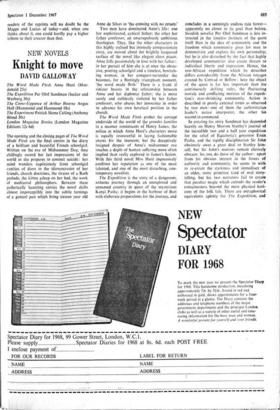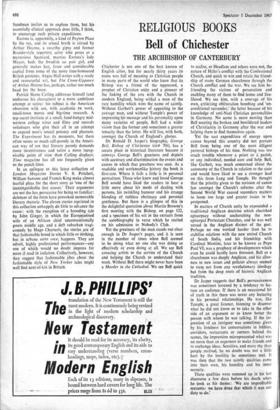NEW NOVELS
Knight to move
DAVID GALLOWAY
The Word Made Flesh Anne Hurt (Mac- donald 25s) The Expedition Per Olof Sundman (Seeker and • Warburg 30s) The Come-Uppance of Arthur Hearne Angus Hall (Hammond and Hammond 18s) The Experiment Patrick Skene Calling (Anthony Blond 30s) London Magazine Stories (London Magazine Editions 12s 6d) The opening and the closing pages of The Word Made Flesh are the final entries in the diary of a brilliant and beautiful French schoolgirl. Written on the eve of Midsummer Day, they chillingly record her last impressions of the world as she prepares to commit suicide: her mind wanders capriciously from schoolgirl vanities of dress to the idiosyncrasies of her friends, church doctrines, the strains of a Bach prelude, the kitten asleep on her bed, the work of mediaeval philosophers. Between these pathetically haunting entries the novel shifts althost imperceptibly into the subtle turnings of a genteel past which- bring sixteen year old
Anne de Silves to `the crossing with no return.,
Two men have dominated .Anne's life: one her sophisticated, cynical father; the other her father confessor, an unscrupulously ambitious theologian. They, like the other characters in this highly stylised but intensely compassionate story, are moved about the brightly lacquered surface of the novel like elegant chess pieces. Anne falls passionately in love with her father: in her pursuit of him she is at once the obses- sive, pouting schoolgirl and a timeless, bewitch- ing woman; in her conquest-surrender she becomes, for a fleetingly triumphant moment, `the word made flesh.' There is a frank if sinister beauty in the relationship between Anne and her diplomat father; she is more surely and ruthlessly violated by her father confessor, who abuses her innocence in order to advance his own heretical position in the church.
The Word Made Flesh probes the corrupt underside of the world of ttie grandes families in a manner reminiscent of Henry James; the milieu in which Anne Hurt's characters move is equally resourceful in laying fashionable snares for the innocent, but the deceptively tesigned despair of Anne's midsummer eve touches a depth of human suffering more often implied than really explored in James's fiction. With this third novel Miss Hurd impressively confirms her reputation as one of the most talented, and one of the most disturbing, con- temporary novelists.
The Expedition is the story of a dangerous, arduous journey through an unexplored and unnamed country in quest of the mysterious Kanyi Pasha; it begins in the harbour of Bari with elaborate-preparations for the journey, and
Concludes in a seemingly endless rain forest apparently no closer to its goal than before.. Swedish novelist Per Olof Sundman is less in- - terested in the timeless instincts of the quest itself than in the idea of community and the freedom which community gives for man to demonstrate and explore his own personality; but he is also disturbed by the fact that highly developed communities also create threats to individual liberty and expression. Hence, the neo-African expedition which he describes differs considerably from the African voyages created by Conrad or Bellow: here the object of the quest is far less important than the continuously shifting rules, the fluctuating morale and conflicting motives of the expedi- tion's ever-shrinking community. Action is r described in purely external terms as observed - by two men—one of them the authoritarian leader's native interpreter, the other his second-in-command.
In creating his story Sundman has depended. heavily on Henry Morton Stanley's journal of the incredible two and a half year expedition for the relief of Equatoria's governor Ellin Pasha, and the rigidly disciplinarian Sir John obviously owes a great deal to Stanley him- self, but Sir John's motives remain elusively obscure. So, too, do those of the author: apart from his obvious interest in the forces of authority and community, he seems to wish to re-create the starkness and immediacy of an older, more primitive kind of oral story- telling, but his two narrators fail to create that peculiar magic which extends the reader's consciousness beyond the mere physical hori- zons of the folk tale. There are metaphorical equivalents aplenty for The Expedition, and Sundman invites us to explore them, but his essentially clinical approach does little, I think, to encourage such private expeditions.
Eastsea is, apparently, a kind of Peyton Place by the sea, and its sexual broth is stirred by Arthur Hearne, a swarthy gipsy and former Brando-style repertory actor who poses as a mysterious Spaniard, marries Eastsea's lady Mayor, beds the Swedish au pair girl, and generally makes hay, farce and considerable capital from some of the more time-honoured British pastimes. Angus Hall writes with a ready and resourceful wit, but The Come-Uppance of Arthur Hearne has, perhaps, rather too much head for the brew.
Patrick Skene Ceiling addresses himself (and undresses his characters) to a more ambitious attempt at satire: his subject is the American obsession with sex, with academic PR work, small-town mores and big-time research. A top-secret institute at a small, fund-hungry mid- western college wires and films and records volunteers who give their all in an attempt to expand man's sexual potency and pleasure. The Experiment has its moments, but there often seems so much self-parody in the Ameri- can way of sex that literary parody demands more inventiveness and satire a more recog- nisable point of view than Calling displays; Time magazine has all too frequently given us the punch lines.
In an epilogue to this latest collection of London Magazine Stories V. S. Pritchett, William Sansom and Francis King make almost tearful pleas for the short story as 'one of the inextinguishable lost causes.' Their arguments are not the less persuasive for being so familiar: defences of the form have provoked memorable literary rhetoric. The eleven stories reprinted in this collection unhappily do little to advance the cause : with the exception of a brooding tale by John Ginger, in which the Europeanised wife of an African chief unconventionally greets middle age, and a deft suburban tragi- comedy by Hugo Charteris, the stories are of that fashionable breed in which little or nothing, but in urbane sotto voce, happens. They are adroit, highly professional performances—any one of which would no doubt impress far more if read in isolation. Collectively, however, they suggest that fashionable jibes about the fashionable style of New Yorker tales might well find next-of-kin in Britain.



































 Previous page
Previous page